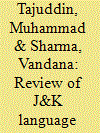| Srl | Item |
| 1 |
ID:
135798


|
|
|
|
|
| Summary/Abstract |
This article revisits the early twentieth century to rethink the forces that shaped discourses surrounding political community—specifically the political community in its regional articulation. As we begin to look at the particular ways in which the discourse of rights and political representation have emerged at the regional level in post-independence India, we begin to get a sense of the unique social, cultural, and political dynamics that constitute the region distinct from the dynamics of nationalism and national identity. Specifically, I examine the dynamics of a new discourse of politics in twentieth-century south India, primarily in the Telugu-speaking districts of the Madras Presidency and the princely state of Hyderabad. With the institution of representational bodies/institutions at the regional level, the extension of the franchise and the rise of a public politics based on liberal ideas of public reason, and debate at the turn of the twentieth century, we witness the emergence of the region as the site of a distinct set of political dynamics.
|
|
|
|
|
|
|
|
|
|
|
|
|
|
|
|
| 2 |
ID:
135302


|
|
|
|
|
| Summary/Abstract |
The Winter Olympic Games in Sochi and the annexation of Crimea were two major international events in which Russia engaged in early 2014. In spite of all the divergence in the logic underpinning each of them, four concepts strongly resonate in both cases. First, in hosting the Olympics and in appropriating Crimea, Russia was motivated by solidifying its sovereignty as the key concept in its foreign and domestic policies. Second, the scenarios for both Sochi and Crimea were grounded in the idea of strengthening Russia as a political community through mechanisms of domestic consolidation (Sochi) and opposition to unfriendly external forces (the crisis in Ukraine). Third, Sochi and Crimea unveiled two different facets of the logic of normalisation aimed at proving – albeit by different means – Russia’s great power status. Fourth, one of the major drivers of Russian policy in both cases were security concerns in Russia’s southern flanks, though domestic security was also an important part of the agenda.
|
|
|
|
|
|
|
|
|
|
|
|
|
|
|
|
| 3 |
ID:
135097


|
|
|
|
|
| Summary/Abstract |
The author analyzes the specifics of political leadership in Georgia and what people think about them, as well as the new trends that came to the fore after the 2013 presidential election, the leadership’s resources, and the ways the political community “recruits” new members.
The author compares the prominent features of the presidencies between 1991 and 2014 to explain the subtleties of political leadership in Georgia.
He also tries to examine why the Constitution is regularly amended to redistribute legal powers between the president and prime minister.
|
|
|
|
|
|
|
|
|
|
|
|
|
|
|
|
| 4 |
ID:
135150


|
|
|
|
|
| Summary/Abstract |
Political community is the basis of modern polity. In federation, two polities and their respective political communities are related according to the constitutional structure. Political community is constructed through mass education and its medium. Common mass education though a common language inculcates common values among peoples differing in their habitations, mother tongues and strata. Nehru’s visionary language policy defused centrifugal forces and strengthened centripetal forces in the process of Indian political community formation. Political community formation in Jammu and Kashmir began in the reign of Pratap Singh with the adoption of Urdu as the official language and the medium of mass education. The process was communalised in 1920s when the Urdu–Hindi controversy began. The communalised political communities were further broken into contesting ethnic communities after independence due to faulty language policies of successive governments. One polity with multiple political communities has become the biggest hurdle for integration of J&K with India.
|
|
|
|
|
|
|
|
|
|
|
|
|
|
|
|
| 5 |
ID:
134469


|
|
|
|
|
| Summary/Abstract |
Karl Deutsch focused in his work on many social, political and technical aspects of building political community which can enrich our understanding of international cooperation and European integration. It is especially his concept of the political community that helps us to explain current problems of the European integration: namely, the current pre-occupation with the market and institutions leads to the neglect of the common redistribution and of the horizontal ties among the state institutions and among the peoples. This article also points to the tension between Deutsch’s awareness that the study of political communities requires the examination of values, love and spirituality, and his positivist, quantitative methods which do not allow for such an examination. This tension invites to a re-reading of Deutsch, which can enrich the liberal tradition of international relations (IR).
|
|
|
|
|
|
|
|
|
|
|
|
|
|
|
|